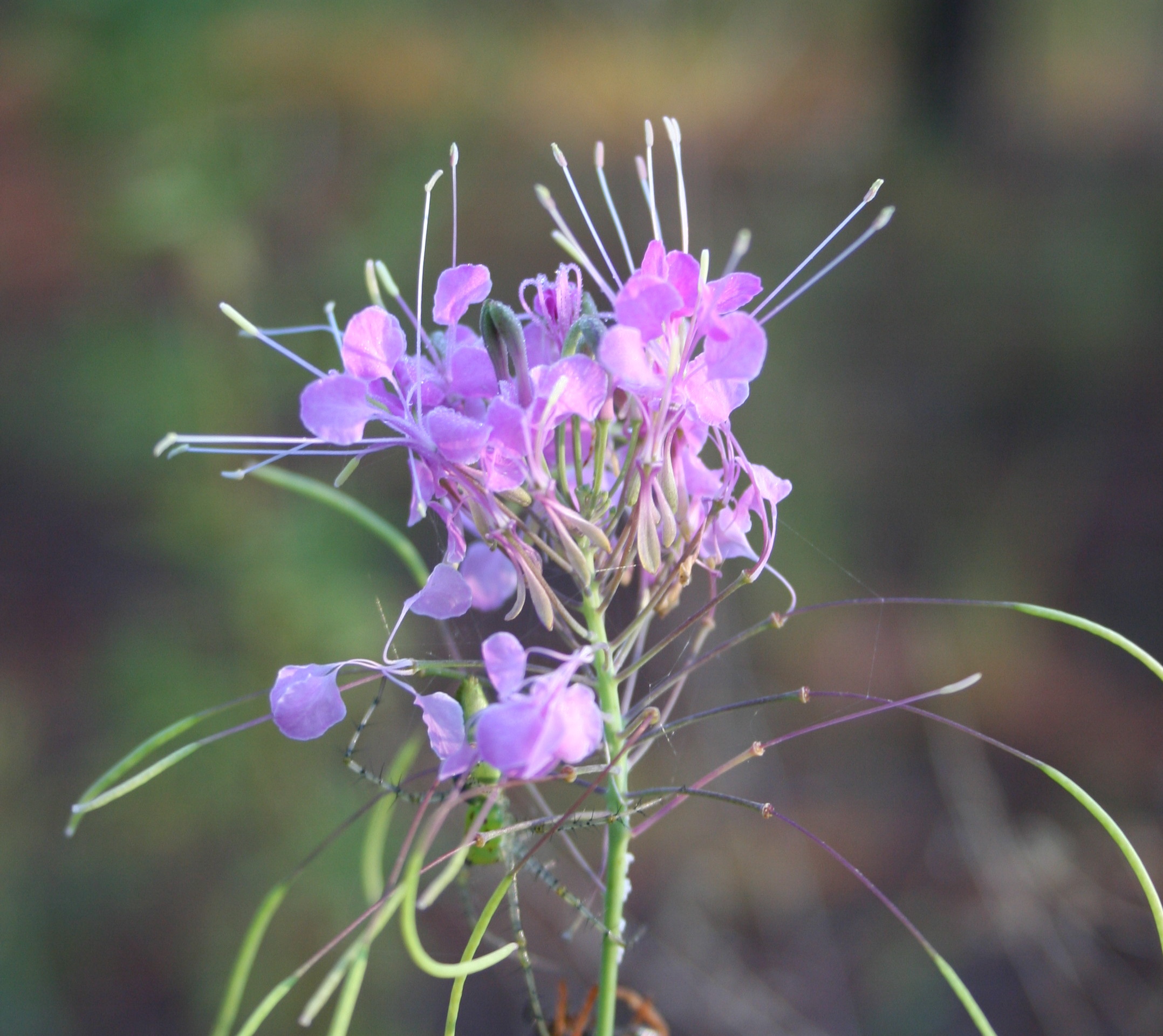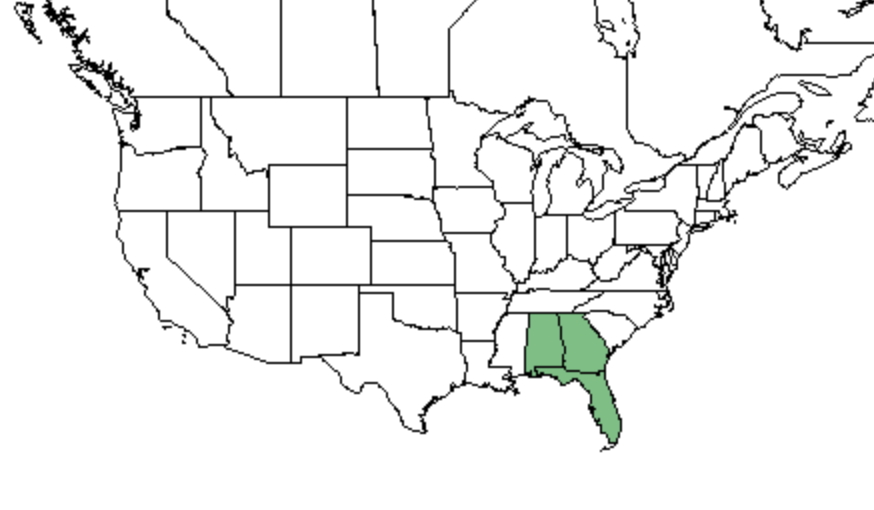Difference between revisions of "Warea sessilifolia"
HaleighJoM (talk | contribs) (→Ecology) |
|||
| (4 intermediate revisions by 3 users not shown) | |||
| Line 24: | Line 24: | ||
==Distribution== | ==Distribution== | ||
| + | ''Warea sessilifolia'' is endemic to the east Gulf Coastal Plain in a narrow belt from southwest Georgia to southeast Louisiana and northwest Florida.<ref>Sorrie, B. A. and A. S. Weakley 2001. Coastal Plain valcular plant endemics: Phytogeographic patterns. Castanea 66: 50-82.</ref> | ||
| + | |||
==Ecology== | ==Ecology== | ||
| − | + | ===Habitat=== <!--Natural communities, human disturbed habitats, topography, hydrology, soils, light, fire regime requirements for removal of competition, etc.--> | |
| + | ''W. sessilifolia'' has been found in turkey oak-longleaf pine ridges, scrub oak barrens, slash pine plantations, and longleaf pine-scrub oak-wiregrass areas.<ref name="FSU"> Florida State University Herbarium Database. URL: http://herbarium.bio.fsu.edu. Last accessed: June 2021. Collectors: Loran C. Anderson, Robert K. Godfrey, R. D. Houk. States and counties: Florida: Calhoun, Escambia, Leon, Liberty, and Walton.</ref> It is also found in disturbed areas including disturbed pinewoods, sand ridge clearings, railroads, and along roads.<ref name="FSU"/> Associated species: ''Polygonella gracilis, Eupatorium compositifolium, Chrysopsis lanuginosa, Vaccinium elliottii, Ilex vomitoria, Pinus palustris, Quercus laevis, Q. geminata, Q. laurifolia, Q. margaretta, Cyrilla racemiflora'', and ''Vaccinium arboreum''.<ref name="FSU"/> | ||
| + | |||
===Phenology=== <!--Timing off flowering, fruiting, seed dispersal, and environmental triggers. Cite PanFlora website if appropriate: http://www.gilnelson.com/PanFlora/ --> | ===Phenology=== <!--Timing off flowering, fruiting, seed dispersal, and environmental triggers. Cite PanFlora website if appropriate: http://www.gilnelson.com/PanFlora/ --> | ||
''W. sessilifolia'' has been observed to flower from August to October and in December with peak inflorescence in September.<ref>Nelson, G. [http://www.gilnelson.com/ PanFlora]: Plant data for the eastern United States with emphasis on the Southeastern Coastal Plains, Florida, and the Florida Panhandle. www.gilnelson.com/PanFlora/ Accessed: 15 DEC 2016</ref> | ''W. sessilifolia'' has been observed to flower from August to October and in December with peak inflorescence in September.<ref>Nelson, G. [http://www.gilnelson.com/ PanFlora]: Plant data for the eastern United States with emphasis on the Southeastern Coastal Plains, Florida, and the Florida Panhandle. www.gilnelson.com/PanFlora/ Accessed: 15 DEC 2016</ref> | ||
| Line 32: | Line 36: | ||
<!--===Fire ecology===--> <!--Fire tolerance, fire dependence, adaptive fire responses--> | <!--===Fire ecology===--> <!--Fire tolerance, fire dependence, adaptive fire responses--> | ||
<!--===Pollination===--> | <!--===Pollination===--> | ||
| − | <!--=== | + | <!--===Herbivory and toxicology=== <!--Common herbivores, granivory, insect hosting, poisonous chemicals, allelopathy, etc.--> |
<!--===Diseases and parasites===--> | <!--===Diseases and parasites===--> | ||
| − | ==Conservation and | + | ==Conservation, cultivation, and restoration== |
| − | == | + | |
| + | ==Cultural use== | ||
==Photo Gallery== | ==Photo Gallery== | ||
<gallery widths=180px> | <gallery widths=180px> | ||
</gallery> | </gallery> | ||
==References and notes== | ==References and notes== | ||
Latest revision as of 13:30, 18 July 2022
| Warea sessilifolia | |
|---|---|

| |
| Photo by T. Miller, 2014 | |
| Scientific classification | |
| Kingdom: | Plantae |
| Division: | Magnoliophyta - Flowering plants |
| Class: | Magnoliopsida - Dicotyledons |
| Order: | Capparales |
| Family: | Brassicaceae |
| Genus: | Warea |
| Species: | W. sessilifolia |
| Binomial name | |
| Warea sessilifolia Nash | |

| |
| Natural range of Warea sessilifolia from USDA NRCS Plants Database. | |
Common names: Sessile-leaf pineland-cress, Sessile-leaf warea
Contents
Taxonomic notes
Description
A description of Warea sessilifolia is provided in The Flora of North America.
Distribution
Warea sessilifolia is endemic to the east Gulf Coastal Plain in a narrow belt from southwest Georgia to southeast Louisiana and northwest Florida.[1]
Ecology
Habitat
W. sessilifolia has been found in turkey oak-longleaf pine ridges, scrub oak barrens, slash pine plantations, and longleaf pine-scrub oak-wiregrass areas.[2] It is also found in disturbed areas including disturbed pinewoods, sand ridge clearings, railroads, and along roads.[2] Associated species: Polygonella gracilis, Eupatorium compositifolium, Chrysopsis lanuginosa, Vaccinium elliottii, Ilex vomitoria, Pinus palustris, Quercus laevis, Q. geminata, Q. laurifolia, Q. margaretta, Cyrilla racemiflora, and Vaccinium arboreum.[2]
Phenology
W. sessilifolia has been observed to flower from August to October and in December with peak inflorescence in September.[3]
Conservation, cultivation, and restoration
Cultural use
Photo Gallery
References and notes
- ↑ Sorrie, B. A. and A. S. Weakley 2001. Coastal Plain valcular plant endemics: Phytogeographic patterns. Castanea 66: 50-82.
- ↑ 2.0 2.1 2.2 Florida State University Herbarium Database. URL: http://herbarium.bio.fsu.edu. Last accessed: June 2021. Collectors: Loran C. Anderson, Robert K. Godfrey, R. D. Houk. States and counties: Florida: Calhoun, Escambia, Leon, Liberty, and Walton.
- ↑ Nelson, G. PanFlora: Plant data for the eastern United States with emphasis on the Southeastern Coastal Plains, Florida, and the Florida Panhandle. www.gilnelson.com/PanFlora/ Accessed: 15 DEC 2016